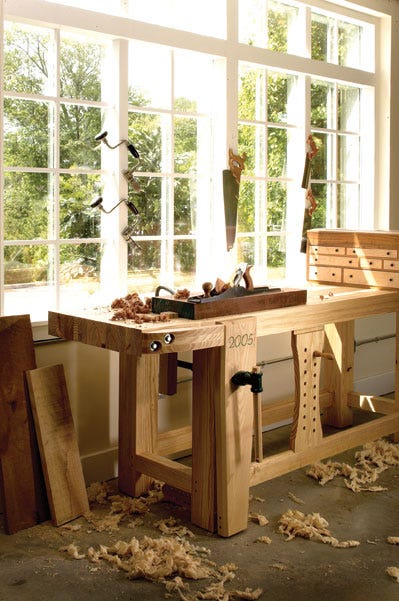The Dancing Monkey Sauce
Note: I don’t usually take requests for specific topics at The American Peasant, but this is a special case. One reader commented that they were struggling to get customers for their furniture work. They were following all the guidelines I’d written about before. What else could it be? This is one answer.
After about five years of working at this craft every day, I learned two things.
1. Woodworking is the only thing I want to do for a living.
2. I will never achieve the level of technical mastery that I long for.
How do I reconcile those two notions?
If I’ll never be as good as <insert name of technical genius here>, how will I make enough money to live? Because <technical genius here> seems to struggle to make a decent living.
Here was my conclusion: I had to attract attention to my work in a way that didn’t depend on breathless displays of flawless dovetails, hand-rubbed <insert wee-wee joke here> or the words “master,” “fourth-generation” or “bespoke artisanal curated atelier” bullshit.
And here is where it gets embarrassing.
I don’t like to talk about what makes my work sell. Not because it’s some secret – most of it’s obvious. But because I don’t think I have it all figured out. I mean, this is just what I do. Maybe I just got lucky during this 29-year-stretch. Or maybe it feels like I don’t deserve this life because I’m not some classically trained (or self-taught) builder of extremely Fancy Lad objects.
Perhaps I’m just the error that proves the rule. Or I’m worried that – mayhap – the simple hubris of explaining myself will finally drive my business into a ditch.
But here we go.
First thing about my work: I research and build things that no one (or very few people) make these days.
When I first started writing about Roubo workbenches in 2005, there was only one short chapter about them in Scott Landis’ book on workbenches. And the Roubo bench shown there was (sorry to say) sub-inspiring. It was too narrow. And… well read the chapter yourself and decide.
At that time, everyone was building German (aka Euro) workbenches, Shaker benches, Frank Klausz benches, Ian Kirby benches and Tage Frid benches. All these benches were insanely complicated to build. They were nice benches, but they were more than you needed to get started building furniture.
Roubo workbenches became a thing. So much so that there’s been a delightful backlash.
I followed the same script when I wrote “Campaign Furniture” (at the time there was only one out-of-print book for collectors extant). Then Roman workbenches (almost every historical reference to them was wrong). British tool chests (well that was unexpected). And, of course, vernacular stick chairs.
How do you find topics like these for yourself? They aren’t in modern woodworking books or magazines. They aren’t talked about on the woodworking forums or on YouTube.
For most of human civilization, everything was made of wood, rocks and little pieces of metal. There are vast historical swaths of furniture, joinery, embellishment and finishing that are completely forgotten and ripe for rediscovery. Woodworking-wise, today we live in a retrograde society.
Amazing ideas are sitting in plain sight in museums, history books, paintings, archaeological sites, old furniture books for collectors, old encyclopedias – anything that explores the wooden-clad world before the Industrial Revolution.
Recently I read an old text that mentioned that lumberyards used to soak boards in salt water for a few weeks to make the boards hard. It was just one simple line of text. There’s a 2-percent chance that line could lead to a book – or at least a good blog entry.
Put another way: Everyone has written (almost) everything we need to know about Shaker furniture. The only things left are crumbs. Why settle for crumbs when you can wander into a rich and entirely unexplored furniture tradition in Romania, Finland or Idaho?
The second thing about my work: I transform into a dancing monkey for the things I am interested in. Talk your trash about me, but I share everything I learn, and I broadcast it on all channels. I encourage other people to investigate <my weird idea>, I reach out and praise other people who dabble in <weird idea>.
Oh, and I slap down people who say <weird idea> is too weird. But that’s just for funsies.
Keep reading with a 7-day free trial
Subscribe to The American Peasant to keep reading this post and get 7 days of free access to the full post archives.



